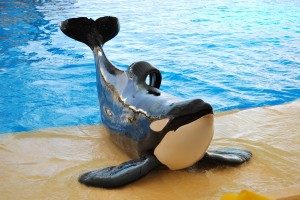Earlier today SeaWorld announced to the media that it was making major changes in its practices when it comes to marine wildlife. The announcement comes after years of bad publicity and failing stock prices as the result of the documentary Blackfish, criticism from marine mammal and marine conservation scientists and an unrelenting social media campaign by online activists. The changes announced are a major paradigm shift for the company and include:
- No more “sea circus” shows – shows will now have an educational focus rather than the current trick-based shows.
- No breeding of captive orcas – the current population of captive killer whales will be the last and will not be replaced.
- Protecting coral reefs and reducing the commercial collection of wild-caught ornamental fish.
- Food products for visitor consumption at all of SeaWorld’s 11 parks, will be only from sustainable sources and they will serve more vegan and vegetarian food.
- SeaWorld will be changing its focus to concentrate on animal rescue and rehabilitation, and that will become the center piece of the parks, rather than a peripheral activity.
- SeaWorld will now get actively engaged in advocacy for several marine conservation issues including:
- Campaigning against so called “scientific whaling”.
- Campaigning against commercial seal hunts.
- Campaigning against the destruction of coral reefs.
- Campaigning against the practice of shark finning.
Conservationists are hoping that SeaWorld will also get involved in putting their considerable resources toward other pressing conservation issues, such as the critically endangered vaquita and Amazonian/Indian river dolphins – issues on which SeaWorld has never before been engaged.
This shift to become more active in conservation comes after criticism by marine mammal scientists and NGOs regarding the minimal amount of funding SeaWorld has contributed to conservation (e.g., just over $70,000 in total to wild cetacean conservation over a 10 year period ) despite being a billion dollar company.
Critics have pointed out that SeaWorld has for years been trying to portray itself as a leader in marine conservation, yet this announcement confirms that the company has been sourcing its seafood from unsustainable sources. The announced changes are largely being seen as a major step in the right direction by the company.
Dr Naomi Rose, a marine mammal scientist with the Animal Welfare Institute and one of SeaWorld’s most persistent scientific critics, said “We have been campaigning for decades for SeaWorld to phase out captive orcas. We have been asking them to evolve their business model. This announcement fits the bill!”
This announcement, in many respects, is like winning the battle of Helm’s Deep for the orca advocacy community.
An orc advocate … not to be confused with an orca advocate
